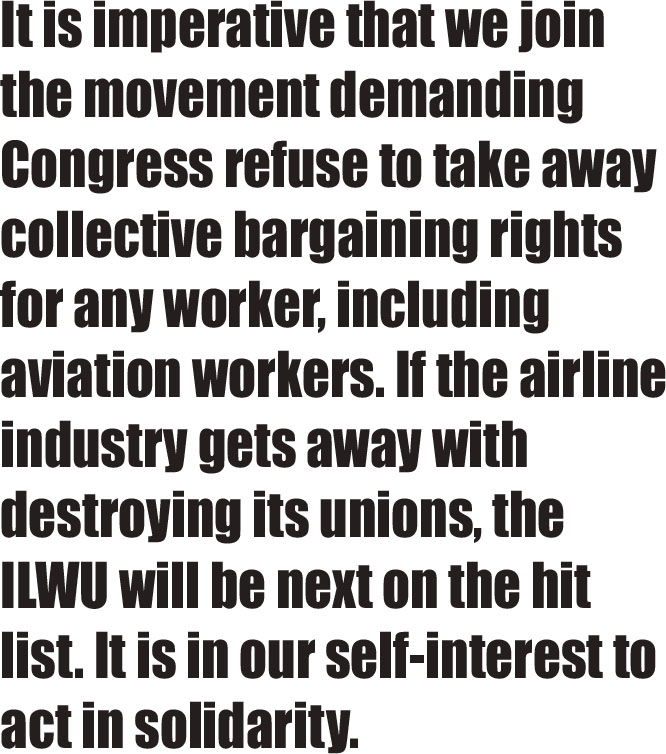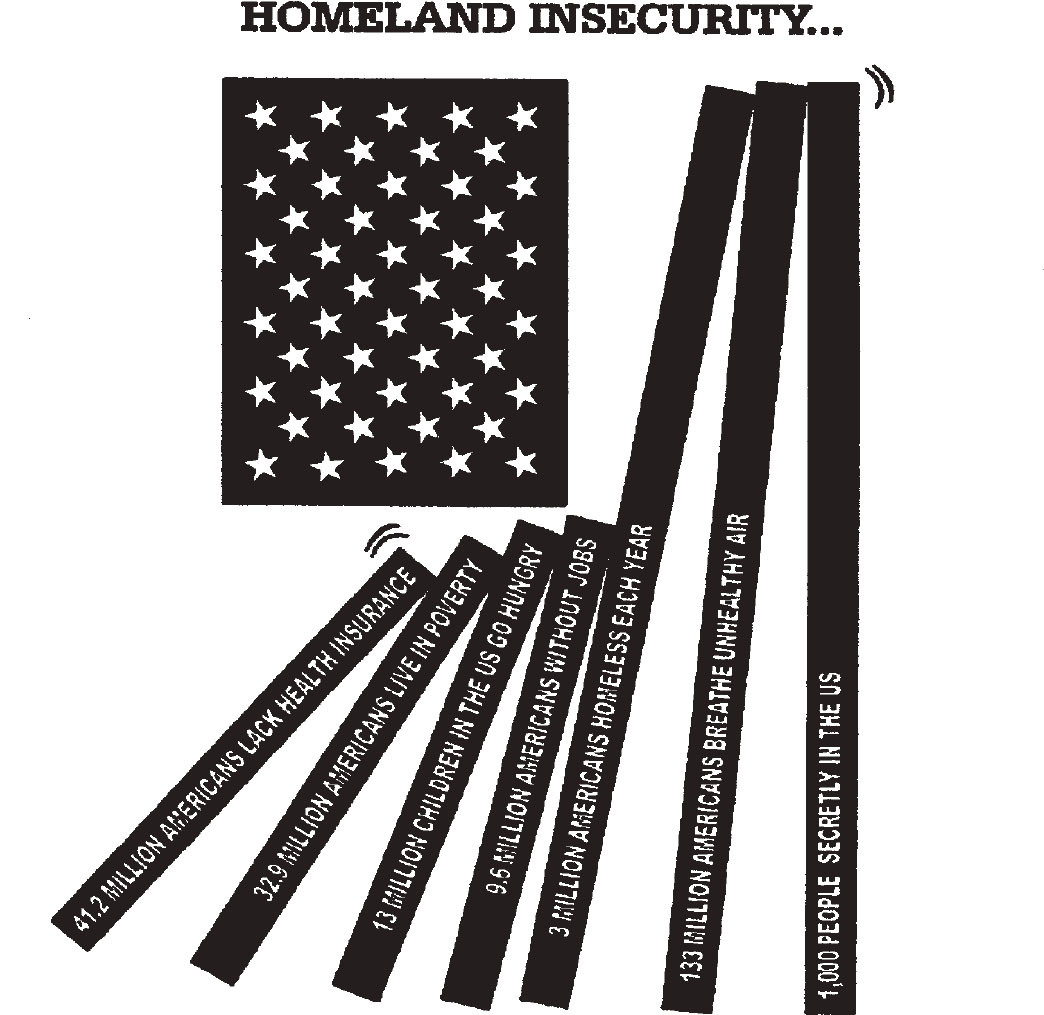Attack on our nation’s transportation workers
The year 2002 will become a major part of the ILWU legend. Looking back, it is difficult to fathom how the ILWU remains strong given the array of forces lined up to destroy this union.
The ship-owners and stevedoring companies, the politically powerful retail industry and the United States government all colluded in waging a war against the working people of this union because they don’t like what the ILWU stands for. This union stands for real power in the hands of workers. This union stands for social justice. This union stands for an end to the exploitation of workers. Make no mistake about it. These forces wanted Congress topass legislation to destroy the power of the ILWU. They still do.
Consider the fact that Chuck Raymond, Chairman of the Maritime Transportation System National Advisory Committee and CEO of CSX Lines wrote in the Journal of Commerce supplement (Jan. 13, 2003), “The major industry challenge for 2003 is to reinforce our transportation system with laws and practices that keep our people working and good flowing. He argues
that the extreme Taft-Hartley Act is not a good enough tool for anti-labor, anti-worker forces to clamp down on the union. Raymond echoes the values of many in business in this country who place the flow of commerce well ahead of the values of
social justice and the empowerment of workers.
Let’s face it. The ILWU greatly benefited from the solidarity of unions around the world, but particularly the unprecedented support of AFL-CIO Secretary-Treasurer Richard Trumka and his staff of hard-working trade unionists. We needed that solidarity to win the battle for a fair contract.
Now the workers in the airline industry face a similar predicament. The industry is using its economic troubles, and the tragedy of 9/11 to push through Congress legislation to take away the collective bargaining rights of aviation workers. Just as
the AFL-CIO came to our aid, the ILWU must do whatever is necessary to help these struggling unions in the airline industry. It is imperative that we join the movement demanding Congress refuse to take away collective bargaining rights for any
worker, including aviation workers. If the airline industry gets away with destroying its unions, the ILWU will be next on the hit list. It is in our self-interest to act in solidarity.
Here’s the issue. Senator John McCain (R- AZ) introduced the Airline Labor Dispute Act, S. 1327 in the last Congress. That
bill would take away collective bargaining rights for aviation workers. McCain’s staff is currently rewriting the bill. It
would give authority to the Secretary of Transportation to declare an “air transportation emergency” and force arbitration upon finding that a labor dispute involving an airline serving a hub airport threatens the local economy, foreign commerce, the
balance of payments, or U.S. national security or foreign policy. In reality, the bill would force every union in the airline industry into arbitration and collective bargaining will become a thing of the past.
The bill does not even call for a fair arbitration process. The McCain legislation introduced last year includes language that prohibits the arbitration from selecting the union’s proposal for a multitude of reasons if the union’s proposal increases costs,
while there are no stipulations to keep the arbitrator from selecting a management proposal for any reason. Airline unions call the legislation what it really is, the “Management Cramdown Bill.”

Most of the airline industry, including the notoriously anti-union Federal Express, are united behind this legislation and believe its prospects for passage are good. Air Transport Association (ATA) President Carol Hallett declared Dec. 19, 2002 that the Railway Labor Act, which governs contract negotiations for airline industry workers, “urgently needs correction,” and
has created “agreements that dangerously weaken airlines.” Hallett said that the prospects for passage of the legislation are bright in 2003 because the Republicans now control the House, Senate and White House.
“There is a real opportunity for this legislation to move forward,” Hallett emphasized.
Much as PMA organized the West Coast Waterfront Coalition, the airline industry has formed the so- called “Communities for Economic Strength Through Aviation,” comprising approximately 400 organizations to lobby Congress for legislation adverse to airline unions.

It is very difficult to pass legislation through the United States Senate without some level of bipartisan support. Just as the Pacific Maritime Association hired a former Democratic member of Congress from California, Mel Levine, to lobby fellow Democrats in Congress against the ILWU, the airline industry has done the same thing. The industry has retained former
Rep. Vic Fazio (D-CA) , and former Senator Chuck Robb (D-VA) to garner support from Democrats in Congress. These former members of Congress—all of whom had decent labor voting records—demonstrate that most politicians can be bought
to trample on the rights of American workers. The ILWU and the entire labor movement appear to have few permanent political friends.
If the airline industry gets away with its agenda of grabbing power from its workers through the political process, its ploy will be copied by other transportation employers. All the circumstances for arbitration envisioned by the McCain legislation
apply to the ILWU—impact on foreign commerce, injury to the local economy, national security, foreign policy. These are the buzzwords used to malign our union.
It is in the ILWU’s self-interest to kill this bill. I urge all ILWU members to write their Senators and Representatives to urge them to vigorously oppose the McCain legislation that takes away collective bargaining rights for aviation workers. You can use the following addresses and your letter will be delivered to your representatives in Congress:
The Honorable__________________
United States Senate
Washington, D.C. 20510
The Honorable__________________
U.S. House of Representatives
Washington, D.C. 20515
